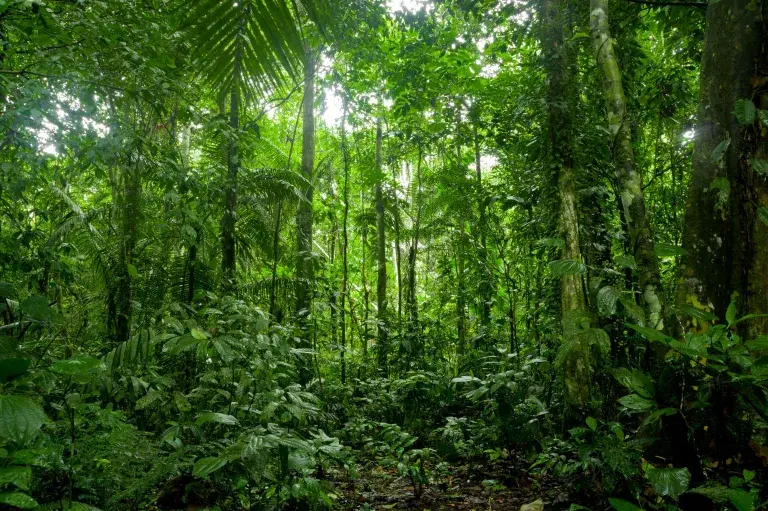Supporting action on deforestation- and conversion-free supply chains
Addressing deforestation and land conversion within supply chains has never been more urgent, as businesses come under pressure to align their operations with global sustainability goals and new regulations. Credible sustainability systems are stepping up with new solutions.
Trade in commodities linked with deforestation poses significant environmental and social challenges. According to The Accountability Framework initiative (AFi) and CDP 2024 report Time for Transparency, land clearance for agriculture accounts for over 10 percent of human-caused greenhouse gas emissions and is linked to at least a third of global biodiversity loss. When forests are cleared, we’re not only reducing nature’s ability to capture carbon – we’re also creating emissions by cutting down trees, which release the carbon they’ve stored when they are burned or rot.
Agricultural expansion, partly driven by demand for commodities, accounts for nearly 90 percent of global forest loss, as noted by the World Resources Institute. This expansion also threatens the rights and resources of Indigenous peoples and local communities.
Companies’ role in eliminating deforestation
Companies have a significant role to play in eliminating global deforestation by adopting, funding and monitoring sustainable and fair practices within their supply chains. However, there remains a gap between corporate commitments and implementation.
The 2024 AFi and CDP’s report notes that while 1,152 companies reported on their management of deforestation in 2023, only 21 percent presented high-quality information for at least one commodity.
More than a third (36 percent) were missing key information or had inconsistencies, highlighting the need for more robust and consistent reporting practices.
Barriers to achieving deforestation- and conversion-free (DCF) supply chains include data gaps and inconsistencies, the complexity and opacity of supply chains, and technical and financial obstacles.
These challenges are compounded in smallholder supply chain contexts. Achieving full transparency is daunting, especially for large consumer goods companies, which can source from over 50,000 direct (tier 1) suppliers at a given time, and many more indirect suppliers.
New regulations
The EU Deforestation Regulation (EUDR) raises the stakes, mandating that from 30 December 2024 companies must demonstrate that products they place on or export from the EU market are:
- Free from deforestation and degradation
- Produced in adherence with the laws of the production country
- Covered by a due diligence statement.
The commodities in scope are wood, soy, coffee, cocoa, palm oil, cattle and rubber. Operators must ensure compliance by collecting information, conducting risk assessments and mitigation measures, segregating materials based on their deforestation risk, submitting a due diligence statement and retaining relevant information.
Who is responsible for what?
The EUDR is the first regulation to require this level of deforestation traceability for globally produced commodities other than timber. This paves the way for similar regulations in other jurisdictions, and driving corporate action at speed.
The Commission has stated that there will be no green lane for certified materials entering the EU, as it is the operator, rather than the sustainability system, who is ultimately responsible for conducting due diligence.
It’s clear, however, that credible sustainability systems will play an important role in supporting their corporate partners with collecting and transferring information, along with risk mitigation.
Sustainability systems poised to support partners
ISEAL Community Members have been working to tackle deforestation and conversion within their systems for many years.
As a result, they’ve developed effective tools and systems to support data collection and verification, information transfer, multistakeholder collaboration and capacity building. They are now adapting these solutions to support their corporate partners effectively meet their EUDR obligations.
For example, the Forest Stewardship Council (FSC) recently launched its FSC Aligned for EUDR strategy to help companies sourcing FSC products meet their EUDR obligations. Its offering includes a revised risk assessment framework and FSC Trace – a blockchain-based platform that will allow FSC licence holders to securely access, verify and exchange traceability data in near real time.
As well as developing in-house deforestation risk maps and upgrading their existing traceability systems, ISEAL Community Members are collaborating with external solution providers to meet client needs.
For example, Fairtrade International has partnered with Satelligence to expand satellite monitoring of forested areas, while the Roundtable on Sustainable Palm Oil (RSPO) has worked with agri-tech partners NGIS, Agridence and CIED to develop PRISMA, a new certification, trade and traceability system.
Complementing these initiatives, ISEAL has launched an ambitious two-year programme funded by Walmart Foundation that will support companies to meet their deforestation-free commitments and EUDR obligations.
In addition, we are working with ISEAL Community Members to upgrade their verification and information systems, share good practice, and develop innovative technical solutions.
Controlled mass balance
Traceability is fundamental, remaining a critical challenge for companies preparing for EUDR. Many companies use mass balance chain-of-custody approaches. These allow certified materials to be mixed with other materials within a supply chain when they are hard to separate.
While mass balance systems track the volume of certified material within a supply chain, they do not trace physical products back to their point of origin – which is what the EUDR requires.
As a result, sustainability systems are now exploring adaptations to their mass balance approach that include minimum performance, verification and data requirements for non-certified materials entering mass balance streams.
This new form of ‘controlled mass balance’ has the potential to meet the requirements of EUDR, while maintaining market competitiveness, flexibility and inclusivity.
Over the coming months, we will be consulting on what this approach could look like. This is just one example of how ISEAL and its members are innovating to provide effective solutions for companies to meet their due diligence obligations.
If you would like to join the conversation and help shape consensus on controlled mass balance, contact Josh Taylor, Traceability Manager, at josh@isealalliance.org.
ISEAL's work on deforestation-free supply chains is generously supported by the Walmart Foundation.
